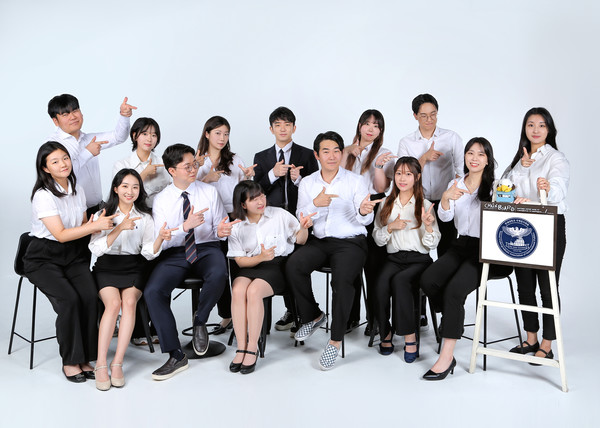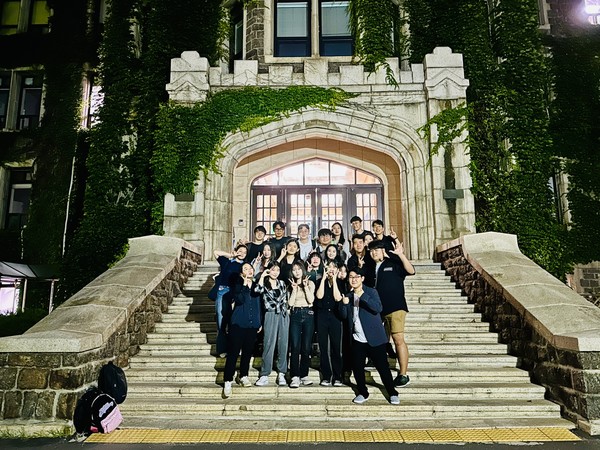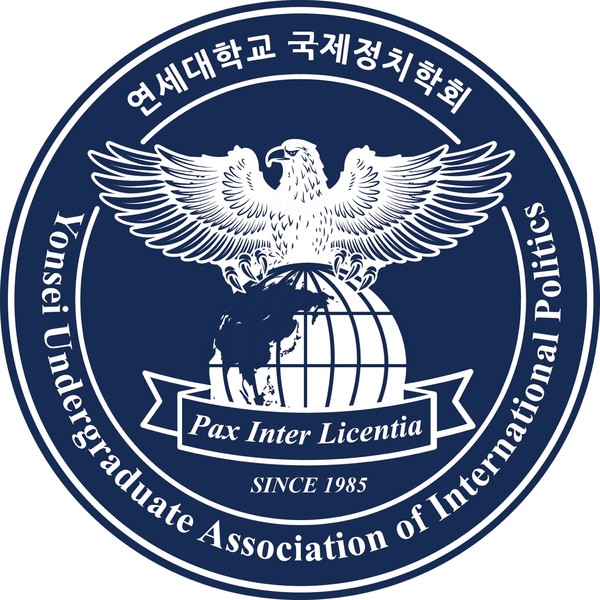Introducing the Yonsei Undergraduate Association of International Politics
WITH AN ever-increasing number of students who yearn to expand their careers internationally, academic clubs and student associations that offer global insights are attracting attention. One group is the Yonsei Undergraduate Association of International Politics which discusses diverse topics including international politics, economics, and the environment. To learn more about this student association, The Yonsei Annals interviewed the president, Kim Hyun-soo (Sr., Dept. of Political Science & Int. Studies) and the former president, Jiye Ryu (Soph., Dept. of Political Science & Int. Studies).
Annals: Could you introduce us to the regular activities that members are required to participate in?
Kim: The regular activities can be encapsulated with two sessions: the one before the seminar and the one after. Before the seminar, members are allocated to specific regions such as Central and South America, Europe, Northeast Asia, and so on. Then, over the course of a week, they research and present international issues concerning their designated region.
Also, the scope of topics is not confined to international politics but includes a wider range of issues that are classified as "non-traditional security" topics, such as the economy and environment. Examples include the default event of Argentina, reduced crop yields in the granary areas, and the Russia-Ukraine War. We have members with diverse interests outside of political issues, and even within the area of politics, members hold different perspectives such as realism and constructivism. Thus, we are open to discussing diverse topics.

The other regular activity is the seminar. During the seminar period, members are paired off to produce a report of ten pages and present it. The report should pertain to theories or realistic cases related to international politics. Each presentation is expected to be about 40 minutes long and those in the audience are required to devise at least 2 questions to fuel the debate, which happens after the presentation. While the workload for the seminar may seem daunting, I want to clarify that it happens only once a semester, which therefore should not burden the members too much.

Annals: What activities or topics did you find the most memorable?
Kim: The most memorable activities for me were joint seminars with Korea University and students from the Political Club of Fontainebleau, France. Sharing opinions with people from different backgrounds allowed me to discover new insights and broaden my scope of view. Also, our interaction with Tong-il Han-ma-dang—Yonsei's Korean Reunification Club—was an intriguing experience, as their focus on the reunification of Korea is not something we commonly deal with in our association. Their insights were valuable to me in drawing connections within international politics that I had not thought of before.
Annals: Can you describe one of those special seminars from last semester?
Ryu: The seminar with the Political Club of Fontainebleau was especially memorable. They proposed to us first that we hold a joint seminar, and following that, we had a series of meetings to discuss the details, including the seminar format, presenters, group discussions, and so on. We encountered difficulties due to the time difference and language barriers, but the patience and endeavors of all members of both countries allowed the smooth sailing in executing our plans.
Annals: How did the joint seminar proceed?
Ryu: The seminar was conducted for two hours which included a brief introduction, presentations, group discussions, feedback, and a debate. The decided theme was to analyze the different political systems of South Korea and France. The main points of discussions were: "How does North Korea influence domestic politics in South Korea?", "Does France have a country that exerts political influence on them like North Korea does on South Korea?", and "How can the bilateral relationship between South Korea and France contribute to resolving international issues?"
The potential discussion topics were shared prior to the seminar so that participants could brainstorm ideas, but we also altered the direction of discussion flexibly based on their interests. For instance, one question that came up was: "How effective would France's presidential reappointment system be in Korea?" I think this opportunity to exchange views with students of different countries on their political interests was especially insightful as we cannot easily have this elsewhere.
Annals: What are the potential benefits of joining this undergraduate association and how is it different from other student associations?
Kim: Our members are passionate and devoted to the discussions, charged with many burning questions on the issues that we deal with weekly. I think this proves our members’ genuine interest in international politics. In this passionate atmosphere, I am confident that anyone can gain valuable insights and a greater depth of knowledge in the field. Also, a great range of programs is offered, which allows networking with renowned organizations and student clubs such as Sejong Institute, East Asia Institute, and International Politics Academy Society of Korea University.
Annals: How has your involvement in the association influenced your career plans?
Kim: Since my career plans lied in studying at law school, joining this association was not part of my plans. However, the experience and knowledge I accumulated here allowed me to specify the studies I want to pursue at law school. For instance, I remember my first seminar, which was about what sovereignty is. I tried to make a connection with international law, but the president, who had a master's degree in politics, presented a perspective employing theories of international politics. This kind of experience, I think, allows me to broaden my perspectives while forming logical arguments, which will certainly impact the field of law that I would like to specialize in.
Annals: As the president of the association, how do you think the club's vision or activities will evolve in the future?
Kim: I want to alter the direction of the seminars to provide our members with fresh insights and implement diverse programs to encompass a broader scope of knowledge. However, I need the approval of every member to implement such changes, which is not an easy task since the members are occupied with their own busy schedules. Also, I would like to strengthen the ties among our members to secure our persistent network even after the members leave the association. A “constant interaction" is what I want to reinforce. I plan to activate our website and hold more friendly get-togethers to solidify membership.
Annals: Do you have any advice for applicants?
Kim: I think the difficulty of the topics that we study may be challenging for freshmen or sophomores who do not have preliminary knowledge about international politics. They may find it difficult to follow or participate in the discussion. This, however, is not meant to discourage them from applying. Anyone who has profound interest in international politics and is ready for in-depth discussions is welcome. Also, many students from majors unrelated to international politics are actively participating in our association and we value their input and insights that are often rooted in their majors.

Annals: Whom do you especially recommend joining?
Kim: I recommend Political Science and International Studies majors who are looking for experience in a student association but not sure which one to join. If you are preparing for law school or a law-related student association, our association will certainly be a stepping stone towards your desired career path.

